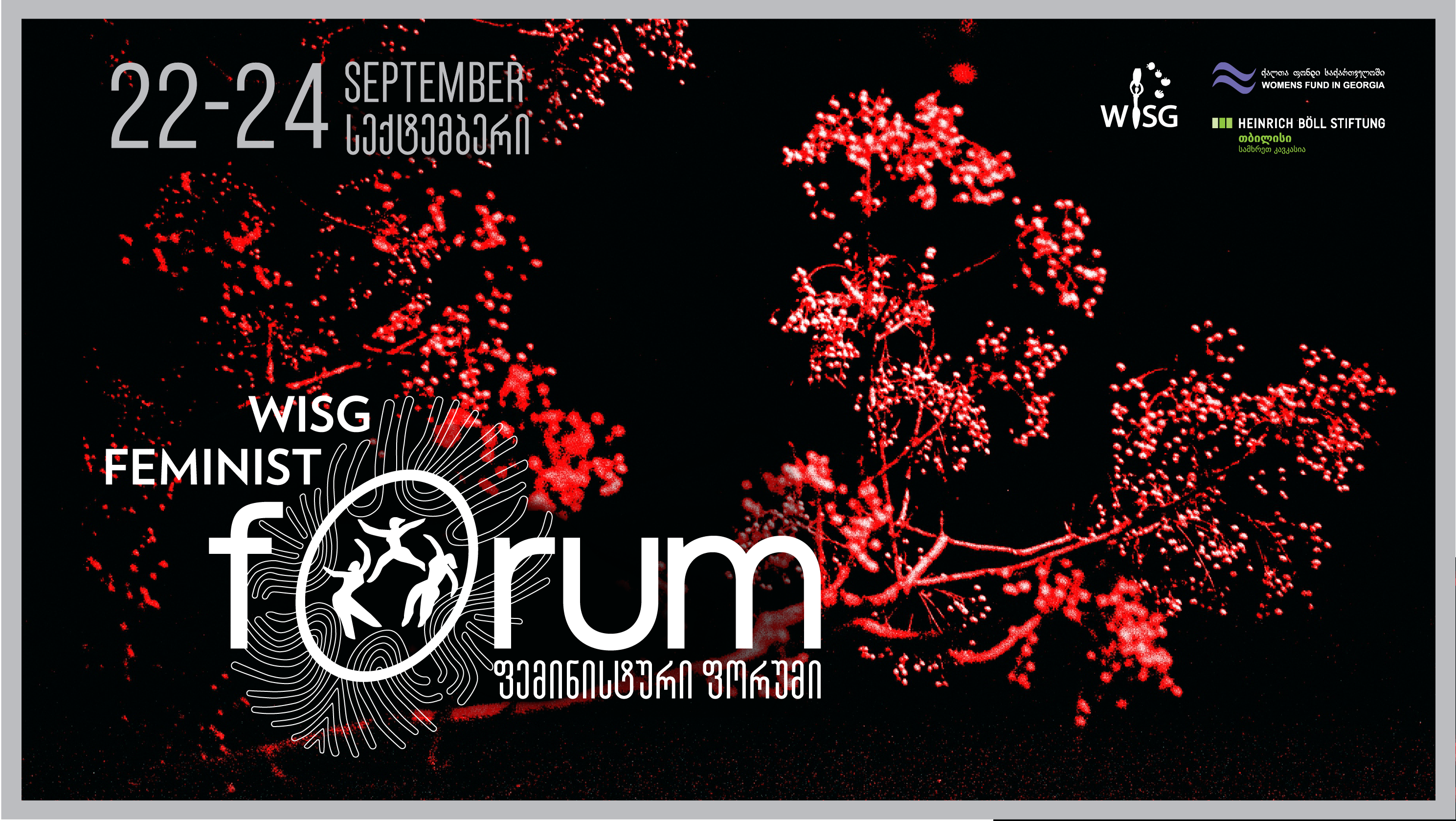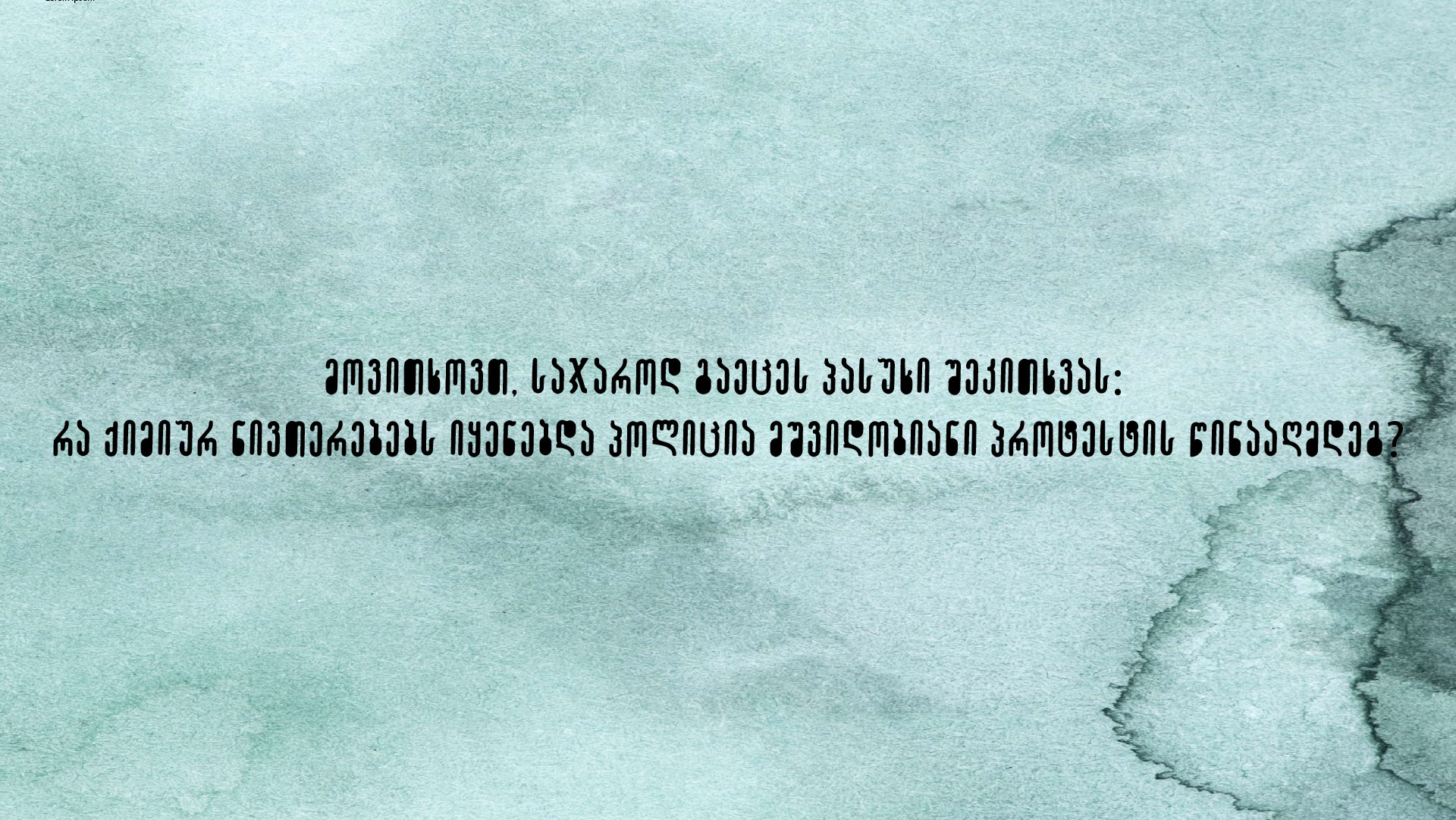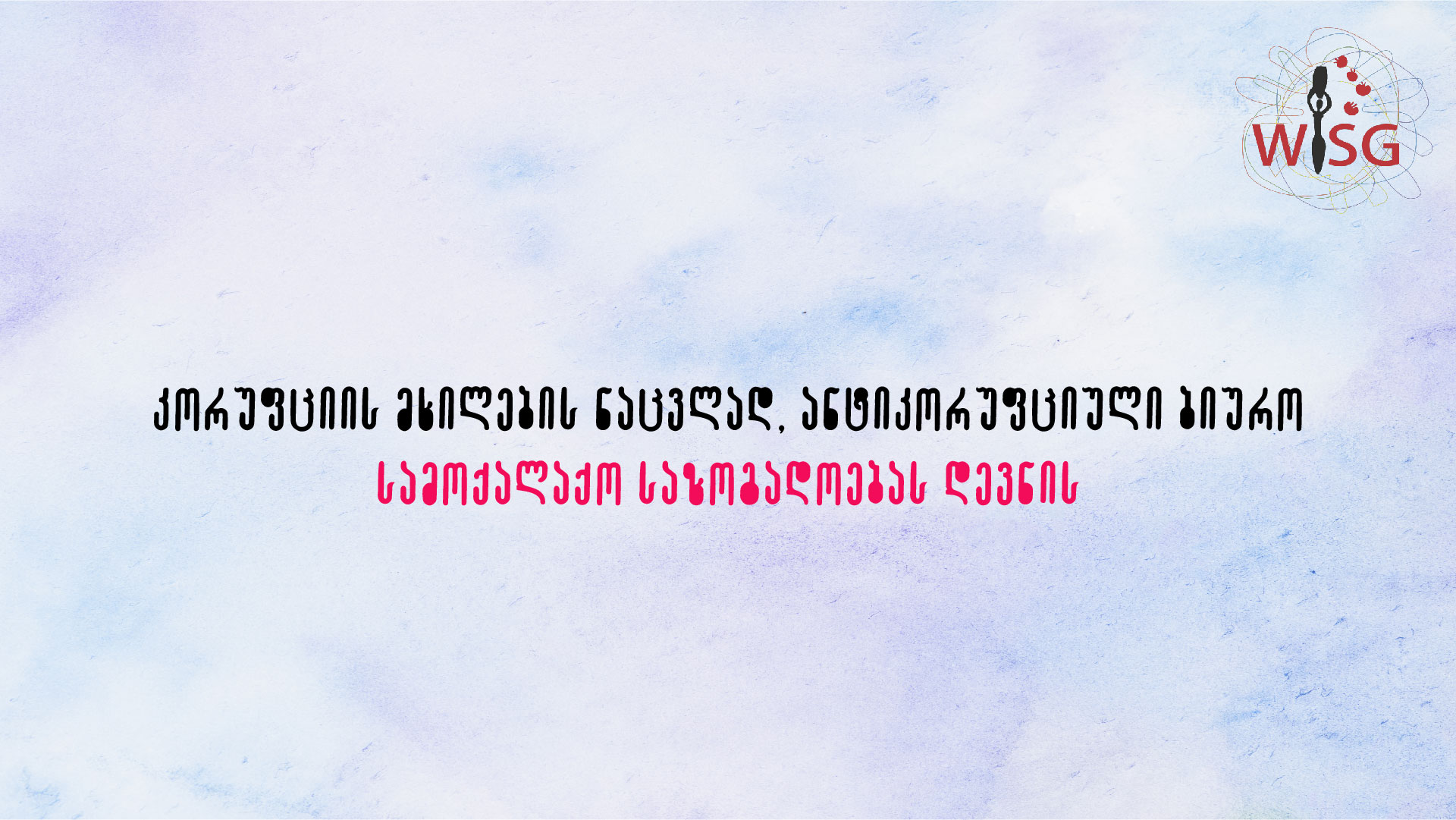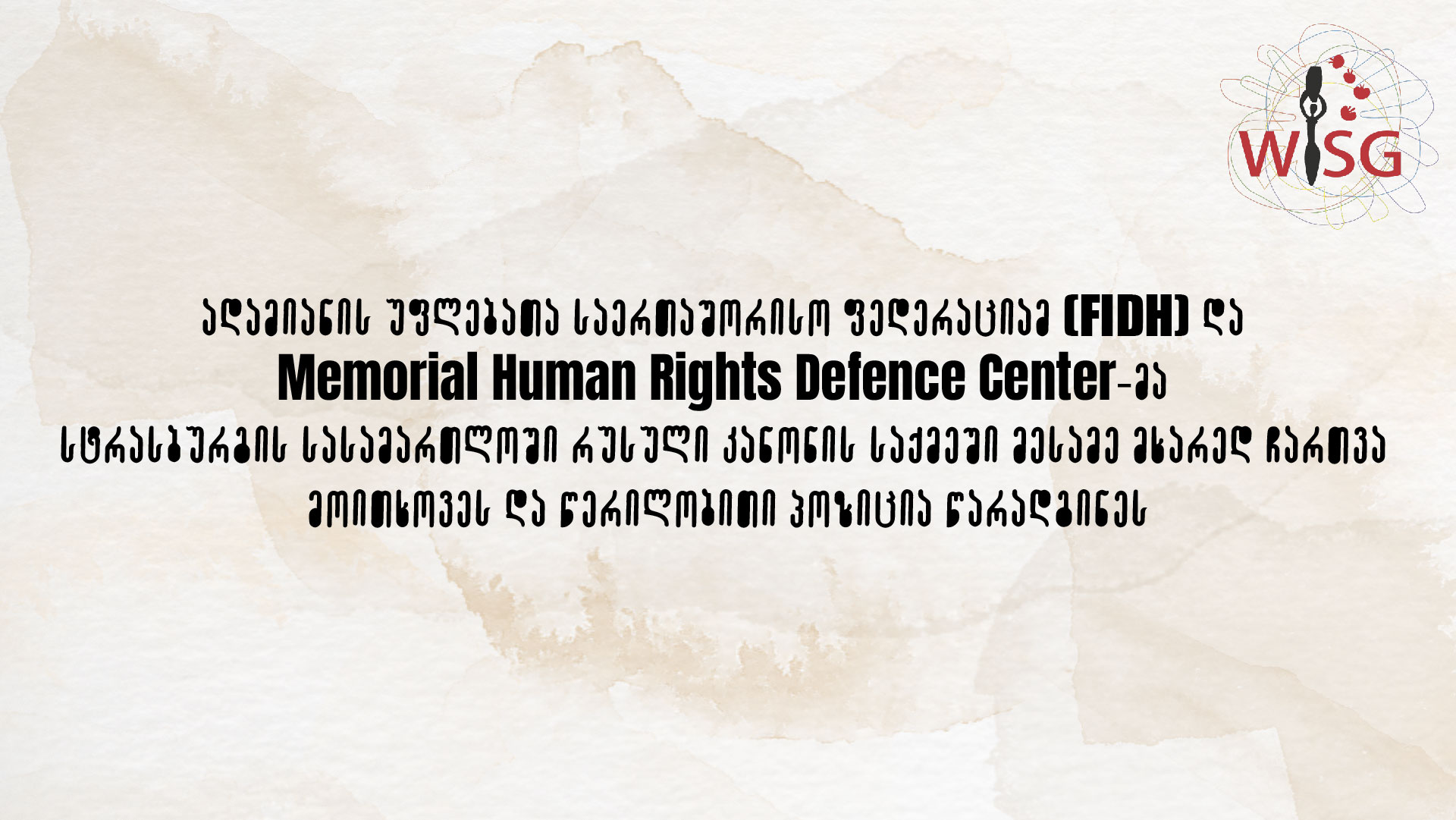Feminist Forum 2023 | The Field and Margins of Knowledge: Power, Epistemic Inequality, and Decolonial Feminist Practice as Resistance.
On September 22-24, 2023, the Women's Initiatives Support Group (WISG) invites you to the Feminist Forum in Tbilisi.
To participate in the forum, please fill out the registration form, which is open until September 18, 2023! Please note that due to space limitations, the number of attendees at the forum is limited. Priority will be given to those who fully attend the forum.
About Feminist Forum
The Feminist Forum is an initiative to create a safe space and an interdisciplinary network, which will connect researchers, activists, students, members of community and arts organizations, formal and informal collectives, for a feminist reflection on social theory and practice. The goal of the Feminist Forum is to support intersectional and solidarity-based cooperation through exchange of knowledge, experience and ideas, and by creating a safe space for critical thinking and analysis.
Feminist Forum 2023 Concept
The central concept and overarching theme of this year's Forum is knowledge. We reject the reduction of knowledge to the Western philosophical concept of 'justified True belief/object,' which has historically been presented in opposition to 'mere opinion' and has been probed for centuries by [privileged men] philosophers.
We are well aware that knowledge is a phenomenon existing in space and time, with a physical and social dimensions; it is inherently local. Knowledge, as a way of perceiving the world, particularly the social world, is constructed from specific social positionalities; it is inherently positional. Knowledge is not only a social practice but also a political process. Knowledge and the institutions where it is housed, both contain and generate hierarchies. Simultaneously, they sustain and reinforce hierarchies of the broader social context. In short, knowledge is inherently political.
Feminist and queer scholars and activists are well aware of this nature of knowledge and its close connection with power. Over and over, we have experienced the injustices of epistemic hierarchies. Feminist critics have scrutinized and explored the biases, prejudices, blind spots, and dominant ideologies hidden behind the mask of impartiality and objectivity of Scientific Knowledge. Decolonial thinkers have posed critical questions about hierarchies within knowledge itself and exposed how binary oppositions —scientific vs. folk, professional vs. popular, academic vs. non-academic, objective vs. partisan, theoretical vs. practical, etc.—marginalizes and subordinates groups of people along diverging axes of difference.
However, recognizing the politics of knowledge production, its entanglement with power and institutions certainly does not mean abandoning the pursuit of knowledge; quite the opposite. The other side of the same coin is the integrity ofknowledge, to the human and more-than-human existence, as a means to challenge social hierarchies and transform the world. This recognition takes on special significance in today's so-called 'post-truth' era.
During the three days of our Feminist Forum, we’ll have the opportunity to immerse ourselves in feminist, queer, and decolonial critiques and reflections through workshops, panel discussions, film screenings, and talks. We will discuss how prevailing knowledge systems and institutions as well as their instrumentalisation by colonial and imperial regimesmarginalizes and devalues our actual experiences. Together, we will outline strategies of resistance and envision the possibilities for knowledge creation and sharing. This collective effort will create avenues to build a plural, diverse, and just world.
The Feminist Forum in 2023 will be held in cooperation with Women's Fund Georgia and with the support of the Heinrich Boell Foundation, South Caucasus Regional Office.
September 22
Focus of the day: Knowing and not knowing: power, politics and epistemic responsibility
Host of the day: Tamar Tskhadadze
When we, from feminist and queer perspectives, discuss the political character of knowledge laden with hierarchies and emancipatory power, our attention falls onto the role and future(s) of feminist and queer knowledge-creating practices themselves, which of course, cannot be reduced to the knowledge produced in academic and research institutions. But, the processes of their institutionalization are significant and interesting aspects of their essence, history, and present-day existence. In the last decades of the twentieth century, the establishment of departments and research centers focusing on women and gender studies was incremental to the feminist and queer struggles in Europe and North America. On the other hand, such an achievement led to both, doubts and, even, controversies— did institutionalization of feminist and queer knowledge in academia lead to creation of internal hierarchies? Was there a growing distance between feminist research and activism? And was this growing gap a result of institutionalization of research? Among post-Socialist countries, academic spaces opened up for feminist and gender studies only after the collapse of the Soviet Union. However, of course, historic circumstances and the logics of articulation are specific in these contexts as well.
10:30 – 11:00 Registration
11:00 – 11:30 Welcoming
Eka Tsereteli, Women’s Initiatives Supporting Group
Women’s Fund in Georgia (tbc)
11:30 – 12:00 Opening Words: Tamar Tskhadadze
Imperialism and the Ethics of Knowledge—Existing Hierarchies and Norms
12:00 – 13:00 Panel Discussion: Hierarchies in Feminist Knowledge-making—Local and Global, Academic and Activist, etc.,
Moderated by: Lika Jalaghania
Participants: Galina Yarmanova, Nargiza Arjevanidze, Nukri Tabidze,
13:00 – 13:45 Discussion
13:45 – 14:15 Coffee Break
14:15 – 15:00 Keynote Speaker: Madina Tlostanova
15:00 – 15:30 Discussion
15:30 – 16:30 Lunch
16:30 – 17:45 Panel Discussion: Gender Studies – as a discipline and knowledge institute, as feminist and queer practice, and as a political battlefield
Moderated By: Tamar Tskhadadze
17:45 – 18:30 Discussion
September 23
Focus of the day: Decolonization of knowledge and epistemic polyphony as anti-colonial feminist practice
Host of the day: Maia Barkaia
The world, scarred with inequality, is woven with an invisible web of power. Anticolonial feminist practice brings to the light the layers of power which cannot be captured in statistics, and unmasks connections that power thoroughly obscures. How is the fate of the oppressed linked with the fate of the earth; what are the links between colonialism, capitalism, modern patriarchy, and retractable destruction of nature.
The colonization of knowledge and mind imposes logics of domination through erasure of histories that make up the humankind. This precedes and is a precondition of the injustice that embodies and underpins our daily life. The objective of anti-colonial feminist practice is to overcome this syndrome of amnesia and revive memories, so that we can remember how interconnections among humans, the planet, and more-than-humans can oppose, challenge, and work through the relationships based on domination.
Anti-colonial feminism poses the burning questions: To which extent can we free ourselves up from the web of power woven into knowledge? Who decides how knowledge is created and for whom? Whose experiences are marginalized? How can we make marginal experiences central? How can we make epistemic polyphony possible? How do we see queer decolonial resistance? What role does art hold in anti-colonial practice? As decolonialization of thinking precedes the desire to act differently, we will talk about alternative ways of creating knowledge as well as engaging in activism and actions (?).
10:30 – 11:00 Welcome Coffee/Tea
11:00 – 11:30 Opening words: Maia Barkaia
11:30 – 12:30 Discussion Panel: In Search of Decolonising Practices in Research, Academia and Activism
Moderated By: Elisabed Gedevanishvili
12:30 – 13:00 Discussion
13:00 – 13:30 Coffee Break
13:30 – 14:30 Discussion Panel: Panel Discussion: Beyond Academic and Geographical Centers: Alternative Spaces and Practices for Knowledge Production and Mutual Exchange in Art and Activism.
Moderated By: Nattan Guliashvili
14:30 – 15:00 Discussion
15:00 – 16:30 Lunch
16:30 – 17:15 Keynote Speaker: Kavita Krishnan
17:15 – 18:00 Discussion
18:00 – 18:15 Coffee Break
18:15 – 19:30 Reflections of and on today
Moderated By: Maia Barkaia
September 24
Focus of the day: Art as a medium for knowledge making and sharing, queer-feminist activism and resistance
Host of the day: Nattan Guliashvili
On the third day, we will discuss the role of Art in the processes of knowledge production and sharing and will try to define its importance for social change and activism. Do we preemptively delimit the creative process when we assign activist function to it? What role do the transformation of conditions and processes of art-creation play in sprouting different types of knowledge? Is a film about a gay couple inherently queer? What do we even mean in queering art? To reflect on these themes and embody feminist concepts, methods, and ethics that we touched upon during previous days, we will embed ourselves in parallel workshops. Then, we will give space to a panel discussion and film screenings. From here on, together with artists, we will discuss the impact of institutionalization of art practices on redistribution of resources, knowledge production and, in general, on the creative process; To inform the critique, our discussions will bring forward existing decolonial practices in the arts. Lastly, in the context of current planetary crises, we will examine the threats of instrumentalising art for various ends, and will question the ethics of representing women, care, queerness, war and ecological crises.
10:30 – 11:00 Welcome Coffee/Tea
11:00 – 13:00 Parallel Workshops:
o What can she know? How the oral history method can help the colonized decolonize knowledge production.
Moderated by: Sona Baldrian
o Oral Histories- Theory and Practice
Moderated by: Tinatin Khomeriki
o Queer Types: Decolonisation of knowledge in graphic design and typography
(*Please, find the workshop abstracts below)
13:00 – 13:30 Coffee Break
13:30 – 14:30 Discussion Panel: Art and Knowledge
Moderated By: Nini Khuroshvili
14:30 – 15:00 Discussion
15:00 – 16:30 Lunch
16:30 – 17:15 Introduction: Mariam Agamian and Galina Yarmanova
Film Screenings:
"Diorama" – (2018)
“Territory of empty windows" – (2020)
17:15 – 17:45 Discussion
19:00 – 22:00 Concluding Event at Left Bank
Workshop Abstracts:
What can she know? How the oral history method can help the colonized decolonize knowledge production.
Sona Baldrian
Queer Types: Decolonisation of knowledge in graphic design and typography
Ana Mikadze
Typefaces, as any other medium can be used to sustain heteronormative capitalism, totalizing the idea of universal design standards dictated by ideologies of modernism. Anything that appears to push back against these ideas might take us to queer people, places, and practices. However, queer acts have been written off in the dominant history that we are exposed to.‘Queer Types’ is an ongoing storytelling project manifesting, among other places, in workshop series by designers Marie Judith Le Gars, Ana Mikadze and Marie Kolarova. The aim of the project is to discover queer typography and question the linearity of graphic design through collective learning and archiving.
Though zine making has been neglected by the mainstream media, it has been a commonly chosen medium among queer individuals and radical queer publishing houses for self-expression. By hosting their queer zine workshop series, the designers gather members of the LGBTQIA+ community to discuss exclusion in graphic design. The results of these discussions are visualized by each participant designing a page for the ‘queer types’ zine or a personal research booklet, a space for personal discussions and explorations. The organized workshops contribute to informing more socially sustainable design research and practice that represent queer understandings of sex and gender. Working with workshop-making allows us to deconstruct/reconstruct the archive. By presenting a non-linear archive and extended works from different horizons we invite different voices to the table, aim to enrich queer narratives and pluralise knowledge.
Oral History - Theory and Practice
Tinatin Khomeriki
The oral history workshop consists of two parts. During the first part, the facilitator and the participants will discuss theory and techniques of oral history. The group will try to answer the questions - What does oral history explore? How is it different from and what does it have in common with other research methods? How do researchers work with the oral history method in postcolonial and postsocialist contexts? What do we mean by “women’s oral history”? The second part will be devoted to practical exercises - group members will work together and observe how oral history techniques work in practice. Finally, we will summarize our impressions.
To participate in the forum, please fill out the registration form, which is open until September 18, 2023! Please note that due to space limitations, the number of attendees at the forum is limited. Priority will be given to those who fully attend the forum.







